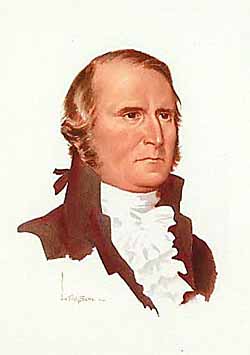Get Today in Masonic History into your Inbox. Sign up today for one of our email lists!
Need an article for your Trestleboard/Newsletter see our Use Policy
Jacob Broom is Born

Today in Masonic History Jacob Broom is born in 1752.
Jacob Broom was an American politician.
Broom was born on October 17th, 1752 in Wilmington, New Castle County, Delaware. He attended old Academy in Wilmington for his primary education. Afterward he became a successful farmer and surveyor.
Even as a a young man he attracted a lot of attention in the business community. In 1776 through his business reputation he began being elected to local offices. His first elected office was assistant burgess or vice-mayor. He was elected to positions on multiple occasions over the coming decades. He was also elected chief burgess or mayor, on four occasions.
Broom was a Quaker and a pacifist, for those reasons he didn't take up arms during the American Revolution. Instead he put his surveyor talents to use and provided maps of the area around the Battle of Brandywine to General George Washington. In 1783 when Washington came back through Wilmington, Broom urged him to "contribute your advice and influence to promote harmony and union of our infant governments which are so essential to the permanent establishment of our freedom, happiness and prosperity."
From 1784 to 1786 and again in 1788, Broom was elected to the Delaware legislature. There he was chosen to attend the Annapolis Convention, whose purpose was to deal with protectionist trade barriers erected by the states.
Broom eventually became part of the Constitutional Convention in Philadelphia and was one of the signers of the United States Constitution. He was in favor of a strong central government. Some of the ideas he pushed for included making the office of the President held until death, making terms in the Senate nine years, and state legislatures be the ones to pay Representatives to Congress.
After signing the Constitution, Broom returned to Delaware, there he continued to work in local government. He also became Wilmington's first Postmaster. He worked on his business, which was operating a cotton mill and a machine shop which produced replacement parts, as well as repaired, mill machinery. In 1802 he sold his business to the DuPonts. The business became the foundation of the modern conglomerate Du Pont.
Broom also served as the chairman of the board for Wilmington's Delaware Bank. His affiliation with Old Academy led him to being involved with it's reorganization to the College of Wilmington.
Broom passed away on April 25th, 1810.
Broom was a member of Lodge No. 14 in Christina Ferry, Delaware.
This article provided by Brother Eric C. Steele.

